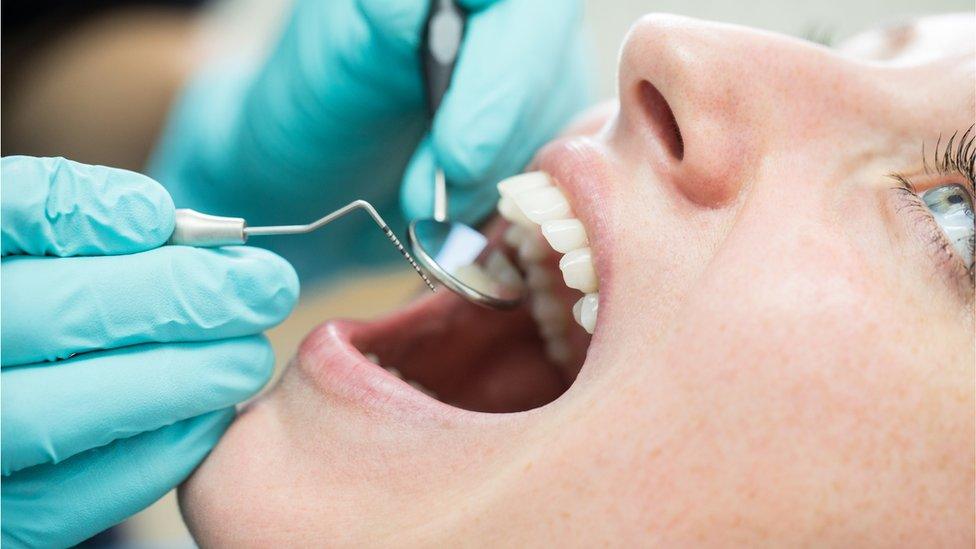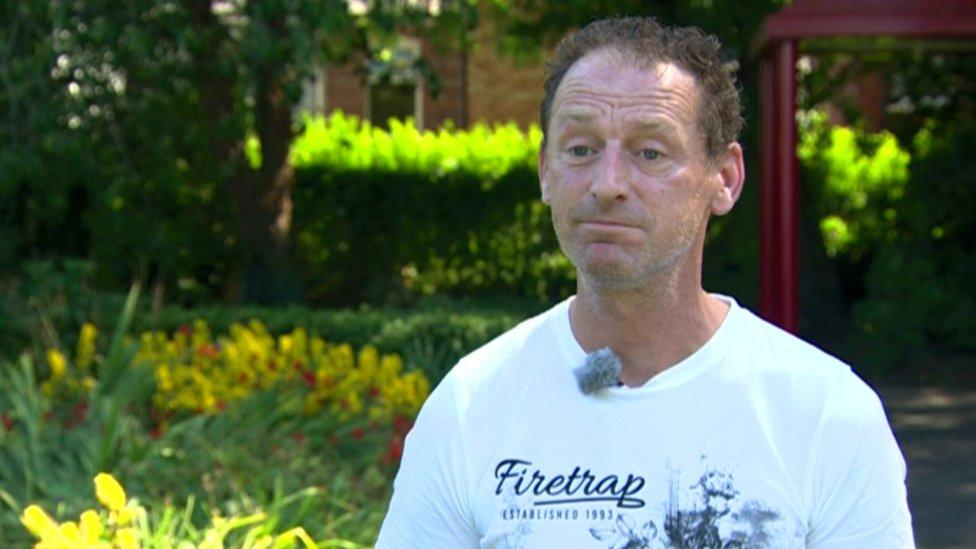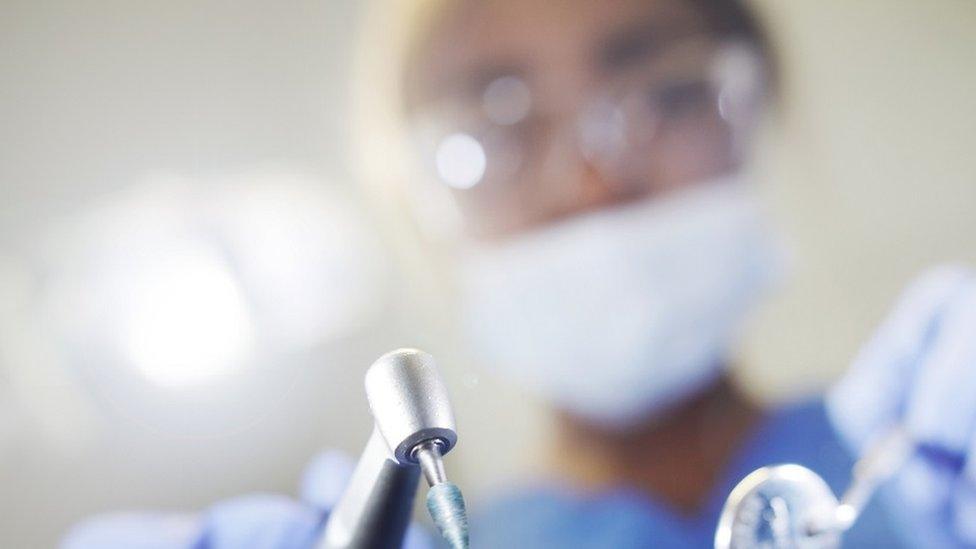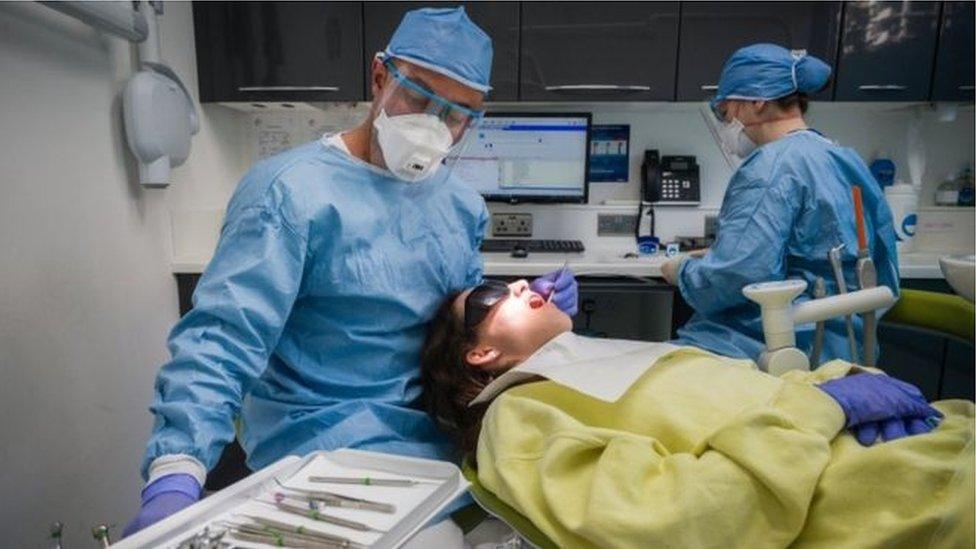Disappearing Dentists: Most practices in NI not taking new NHS patients
- Published
- comments
The majority of health service dentists in NI are not accepting new adult patients.
The majority of health service dental practices in Northern Ireland are not accepting new adult patients, a BBC investigation has found.
Figures show 90% of practices are not accepting new adult patients and 88% were not accepting child patients.
That is despite children in full-time education being entitled to free treatment.
None of the practices contacted in the Antrim and Newtownabbey council area were taking new adult patients.
Stormont's Department of Health said it was developing a dedicated scheme to improve access to dental care for unregistered patients.
The BBC attempted to call all dental practices with a health service contract here and drew up a list of 365.
Some practices were excluded as they were not contactable by telephone or were permanently closed, were not available to the public for general and routine dental care or were not a health service practice.
This left a total of 274 practices.

The British Dental Association says the postcode lottery will only end with real reform and fair funding
Practices were only recorded as taking on new health service patients if they could get an appointment within eight weeks.
While Belfast has the highest number of health service practices, only 8% of them (five out of 64) were accepting new health service adults and children.
None of the 16 practices contacted in Antrim and Newtownabbey council were accepting new patients.
Of those practices in Northern Ireland not taking on adults, 20% (48) said they had an open waiting list, and 11% (28) said the wait time was a year or longer, or were unable to say how long it would be.
Of those not taking on children, 46 (19%) said they had an open waiting list, and 11% (27) said wait time was a year or longer or were unable to say how long it would be.

Some people are going to extraordinary measure to do DIY dentistry as they struggle to find affordable dental care. Are we witnessing the death of NHS dentistry?

The Department of Health said dental services had been "significantly impacted by the pandemic".
It also acknowledged it had been "a difficult and challenging time for many patients who have had to wait much longer than usual for treatment".
"£78m additional funding was invested between 2020 and 2022 to provide significant support to dental practices," it said.
Sorry, your browser cannot display this map
"In April this year, the Rebuilding Support Scheme was introduced. This scheme pays dentists an additional 25% for their activity and was designed to maintain practice business viability and to incentivise increased levels of treatment.
"In Northern Ireland, 67% population are currently registered with a dentist: this is an increase from the 64% registered in the 2014-2021 period.
Of this:
72% of children are registered
66% of adults are registered
In response to the difficulties facing patients, the Department of Health is developing a dedicated scheme to improve access to dental care for unregistered patients who are experiencing an urgent or emergency dental issue.
It is hoped the scheme will be piloted at the end of the summer.

'I can't bear the pain anymore'

Cíaran Hanvey was told the next available appointment was January 2023
Cíaran Hanvey told BBC Newsline he had been suffering with toothache for three months.
After ringing numerous NHS dental surgeries, he was told the earliest he could be seen was January 2023.
He told the BBC he is on painkillers for the pain.
"If you're not registered with NHS dentists, you haven't got a look in," he said.
Mr Hanvey added that he was going to be left out of pocket as appointment delays were "forcing" him to go private.
"My treatment is going to cost me just under £200 and I'll have to pay for that myself because I can't go on with the pain any more."

The British Dental Association said health service dentists - who work as independent contractors - have seen incomes fall by 40% in real terms since 2008/09.
It added that practices were "confronting soaring costs, with 'dental inflation' now estimated at over 11%, meaning many face the prospect of delivering health service care at a financial loss".
It stressed a new system must ensure health service dentistry is financially sustainable in its own right, without being kept afloat by income from private work undertaken by practices.
Dentist leaders are pressing for interim support measures to be put in place until a new contract is implemented.
County Antrim dentist Peter Crooks, deputy chair of the British Dental Association, said: "We knew it was bad but we didn't realise it was quite this bad."
Speaking on BBC Radio Ulster's Good Morning Ulster programme, he said a number of factors were behind the problems in Northern Ireland.
"Much of it is to do with dentists trying to rebuild their practices after Covid. There were a lot of appointments lost at that stage and there's a lot of dental care and need at the minute," he said.
"One of my colleagues wrote in an email conversation last week that his appointment book is booked up for the next seven weeks.
"Before Covid if a dentist had an hour they were able to see four patients, since then they can only see about three patients and that's because of the rise in Covid cases in the last three months."
He added: "Staffing costs have gone up and there are workforce issues, so those costs have gone up about 15%, other operating costs are up about 11% and the fees from the health service are not increasing to the same extent to cover.
"We are lobbying government at the minute to try to try to keep the lights on in practices."
The Disappearing Dentists documentary is available on the BBC iPlayer.

Notes on the research:
A small number of NHS practices would only accept NHS patients in receipt of certain types of benefits. Researchers treated them as taking on new NHS patients.
During the data collection, it emerged that some practices would only take on children if their parent was a patient - in some cases specifically a private patient.
This was flagged in the data as it was a point of interest but the question was not asked in a consistent way.
For the purposes of our analysis, we classified a practice as accepting new child NHS patients if they accepted those under the age of 16.
Related topics
- Published29 June 2022

- Published7 March 2022
